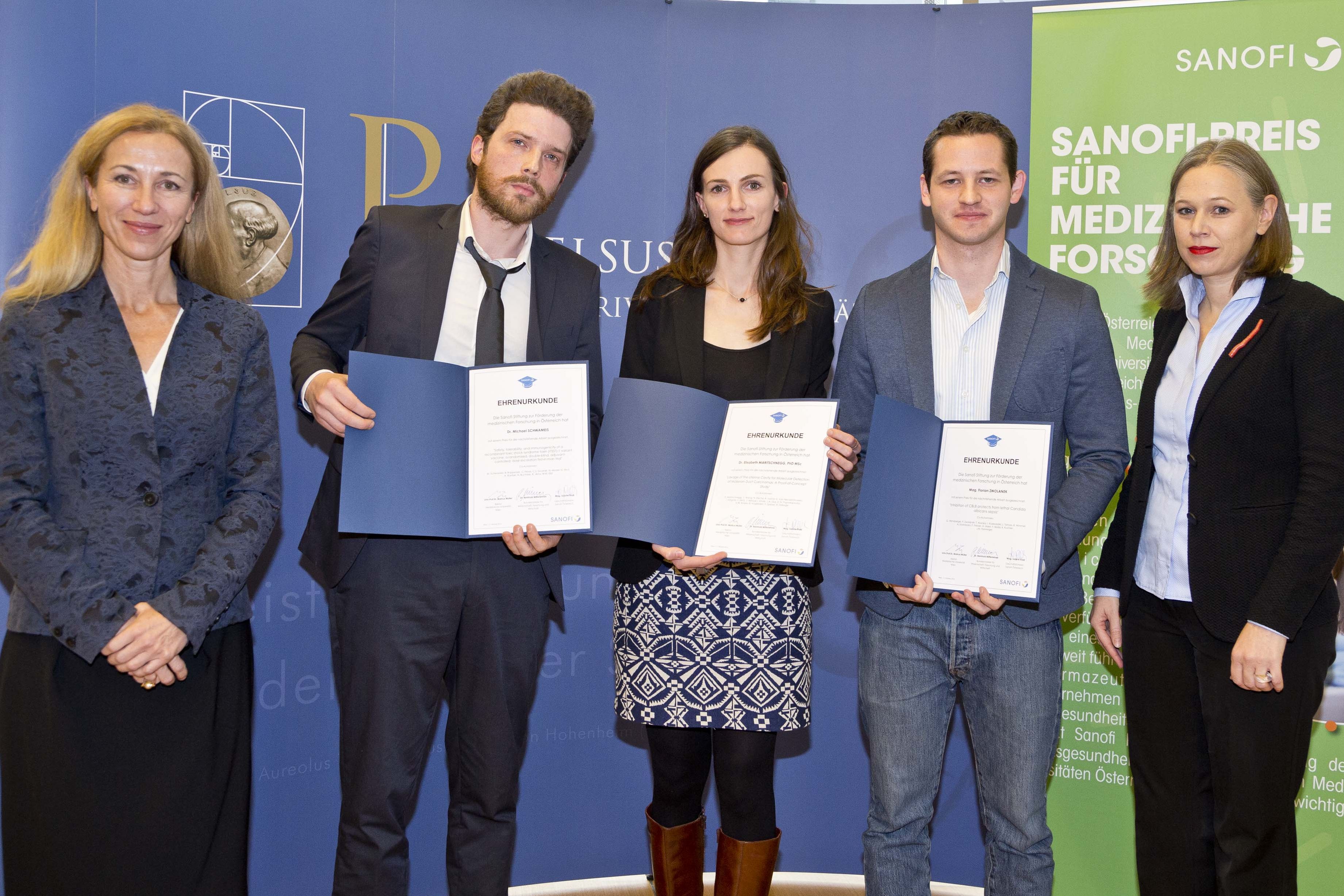
(Vienna, 4 November 2016) At a ceremony held yesterday at the Paracelsus Private Medical University in Salzburg, this year's "Sanofi Foundation" prizes for funding medical research in Austria were presented to a total of 13 researchers. Three of the awards went to researchers from MedUni Vienna: Florian Zwolanek, Michael Schwameis and Elisabeth Maritschnegg.
This distinction is awarded every year to young scientists from the medical universities of Vienna, Graz, Salzburg and Innsbruck. Every year these universities receive a sizeable grant for rewarding outstanding research work.
Florian Zwolanek – "Inhibition of CBLB protects from lethal Candida albicans sepsis"
The human pathogenic fungus Candida albicans is the fourth most common cause of microbial infection in intensive care units and infections with this fungus are associated with a mortality rate in excess of 40%. This work identifies E3 ubiquitin-ligase Cbl-b as a new regulator of the c-type lectin receptors and their intracellular signalling pathways during microbial infection, thus proving for the first time that ubiquitin plays an important role in regulation of the antifungal immune response. This paper contains results and findings that advance our understanding of fungal pathogenesis and provides proof-of-concept that targeted interaction with components of the immune system constitutes a new treatment strategy in the fight against invasive microbial infections.
Elisabeth Maritschnegg – "Lavage of the Uterine Cavity for Molecular Detection of Müllerian Duct Carcinomas: A Proof-of-Concept-Study"
In most cases, Type II ovarian and endometrial cancers are not diagnosed until they are well advanced, which means that the associated long-term survival rates are very low. This publication describes a completely new concept for diagnosis. It is based on an increasing number of reports that Müllerian duct epithelial tumours frequently shed cells at the precancerous stage. The Molecular Oncology working group at the Department of Obstetrics and Gynecology of the Medical University of Vienna have developed a method of collecting and identifying shed tumour cells by lavage of the uterine cavity.
The reported study showed that ovarian carcinomas shed cells and that these can be collected by lavage of the uterine cavity. Using this diagnostic concept, the researchers were able to detect ovarian and endometrial carcinomas and even a clinically occult ovarian carcinoma. These results demonstrate the potential of the concept as an early detection method.
Michael Schwameis – "Safety, tolerability and immunogenicity of a recombinant toxic shock syndrome toxin (rTSST)-1 variant vaccine: a randomized, double-blind, adjuvant-controlled, dose escalation first-in-man trial"
Toxic shock syndrome is a potentially life-threatening condition that primarily occurs in healthy, young women who are menstruating. It is triggered by a toxin formed by the skin bacterium Staphylococcus aureus, "Toxic Shock Syndrome Toxin (TSST)-1". This syndrome was first described in the early 1980s when high-absorbency vaginal tampons came onto the market. Because of their high absorbency, these tampons "could" be left longer in place in the vagina, where they provided a good culture medium for bacterial growth and toxin production. Currently there is no specific treatment or prophylaxis available. Using healthy volunteers, Michael Schwameis et al. have tested the safety, tolerability and immunogenicity of a recombinant vaccine (rTSST-1v), which contains a non-toxic mutation of the bacterial toxin as an antigen. The tested vaccine is well tolerated and immunogenic. Future works will investigate the protective efficacy of the vaccines against TSST-1-related diseases.
The other prizewinners and their papers
Paracelsus Private Medical University, Salzburg
Patricia Peking and Ulrich Koller for "A Gene Gun-mediated Nonviral RNA trans-splicing Strategy for Col7a1 Repair"
Florian Primavesi for "First Episode of Spontaneous Pneumothorax: CT-based Scoring to Select Patients for Early Surgery"
Markus Leitinger for "Diagnostic accuracy of the Salzburg EEG criteria for non-convulsive status epilepticus: a retrospective study"
Medical University of Graz
Jenela Belic, for "Whole-genome plasma sequencing reveals amplifications as a driving force in metastatic prostate cancer".
Ehsan Bonyadi Rad, for "Notch4 Signaling Induces a Mesenchymal-Epithelial-like Transition in Melanoma Cells to Suppress Malignant Behaviors".
Katharina Jandl, for "Activated Protaglandin D2 receptors on macrophages enhances neutrophil recruitement into the lung".
Medical University of Innsbruck
Romana Gerner for "Lipocalin 2 Protects from Inflammation and Tumorigenesis Associated with Gut Microbiota Alterations"
Victoria Klepsch, for "The Nuclear Orphan Receptor NR2F6 Is a Central Checkpoint for Cancer Immune Surveillance".
Martin Puhr, for "PIAS1 is a determinant of poor survival and acts as a positive feedback regulator of AR signaling through enhanced AR stabilization in prostate cancer"
Abstracts of all papers are available in the press corner at: www.sanofi.at.
About the Sanofi Foundation
The Medical Universities of Graz, Innsbruck, Vienna and Salzburg receive a sizeable grant every year. Each medical University identifies its own prizewinners and prizes are awarded retrospectively for the preceding year. The medical universities invite applications for these prizes and applications should be submitted directly to them. Prizewinners are chosen by a board of trustees made up of professors at the universities. Sanofi is represented on these boards of trustees but has no influence upon the decision.